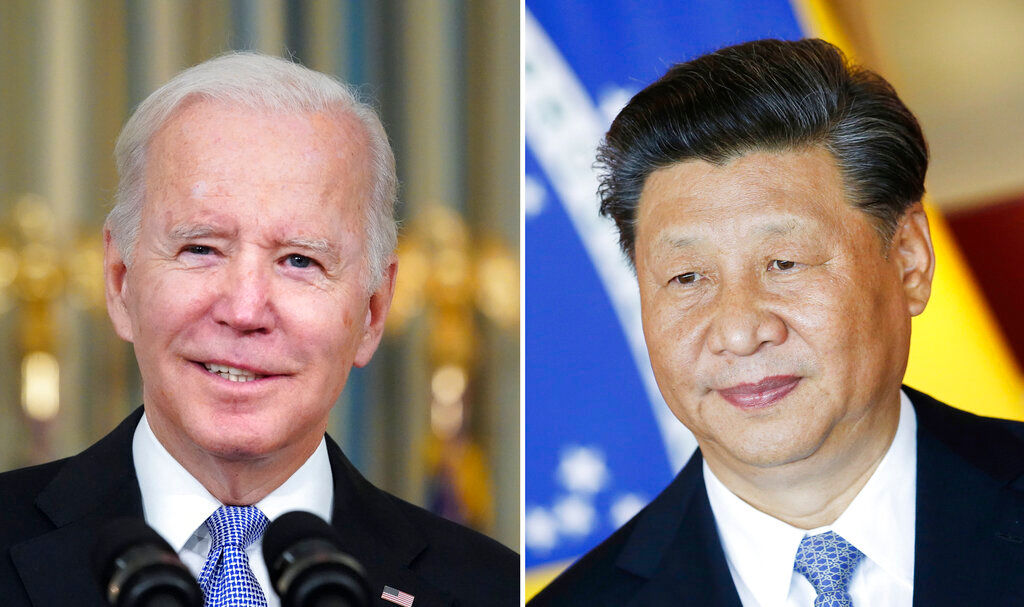US President Joe Biden and Chinese leader Xi Jinping began a phone call Friday in which Biden will pressure his counterpart to join Western pressure against Russia over the invasion of Ukraine, warning of “costs” if Beijing goes to the Kremlin’s aid.
The two leaders started the call, their first since a video summit in November, at 9:03 am ET (1303 GMT), the White House said.
Also read: Russian scientists say Moscow lying about US bioweapons in Ukraine: Report
The high stakes conversation will be a chance for Biden to try and persuade Xi to give up any idea of bailing out Russia from the effects of Western sanctions or even sending military assistance for Russia’s onslaught against neighboring Ukraine.
China’s Xi Jinping said conflicts between states are “in no-one’s interest” during the video call, Chinese state TV reported.
“State-to-state relations cannot go to the stage of military hostilities,” Xi was quoted as saying by official television CCTV. “Peace and security are the most valued treasures of the international community.”
Also read: Zelensky says Ukraine’s application for EU membership to be ready in few months
Wendy Sherman, Deputy Secretary of State, told CNN on Friday that China should come off the fence and join forces with the West against President Vladimir Putin.
China should “understand that their future is with the United States, with Europe, with other developed and developing countries around the world. Their future is not to stand with Vladimir Putin,” she said.
Biden has effectively rallied a strong Western alliance against Russia, while also providing military assistance to Ukrainian soldiers.
However, Beijing has failed to criticise its fellow authoritarian friend, and Washington fears that the Chinese would move to full financial and military support for Russia, escalating an already volatile transatlantic confrontation into a worldwide conflict.
Also read: Vladimir Putin complains of Ukraine stalling talks in call with Olaf Scholz
If this occurs, not only could Beijing potentially assist Putin in weathering sanctions and continuing his war, but Western countries would be forced to make the difficult decision of how to respond to the world’s second largest economy, likely causing market upheaval.
The White House has remained tight-lipped about whether Biden will threaten China with economic sanctions during his conversation, but a reaction is on the table.
Secretary of State Antony Blinken said Biden “will make clear that China will bear responsibility for any actions it takes to support Russia’s aggression and we will not hesitate to impose costs.”
The senior US ambassador encouraged China to use “whatever leverage they have to compel Moscow to end this war,” but he was “concerned that they’re considering directly assisting Russia with military assistance.”
Also read: Russia to miss World Cup qualifier as CAS upholds FIFA ban over Ukraine war
The Biden-Xi chat came after a “substantial” seven-hour meeting in Rome this week between US National Security Advisor Jake Sullivan and Yang Jiechi, the Chinese Communist Party’s leading diplomat.
Against the backdrop of already heightened US-Chinese tensions over Taiwan and trade disputes, Biden and Xi’s capacity or failure to reach an agreement on the impending chaos in Europe will have far-reaching consequences.
When Xi and Putin met at the February Winter Olympics in Beijing, just before Putin unleashed his onslaught on Ukraine, they symbolically solidified their strong partnership.
Since then, Beijing has stood out by refusing to join the international outrage over the invasion, instead siding with Russia in blaming the US and NATO for European tensions. In keeping with Kremlin talking themes, Chinese authorities even refuse to refer to the incursion as a “war.”
China, on the other hand, has tried to stay somewhat vague, proclaiming support for Ukraine’s sovereignty.
Also read: Work from home can help offset a ‘global energy crisis’: IEA explains
According to Brookings Institution fellow Ryan Hass, a former China counsellor to President Barack Obama, Beijing must sift through its competing agendas.
Despite its cosy relationship with Moscow, China, the world’s largest exporter, is inextricably linked to the US and other Western economies. It also wishes to assume global leadership.
“China’s and Russia’s interests are not in alignment. Putin is an arsonist of the international system and President Xi sees himself as an architect for remaking and improving the international system,” Hass said.
“President Xi is trying to balance competing priorities. He really places a lot of value in China’s partnership with Russia but at the same time he does not want to undermine China’s relations in the West,” he added.







